Running Books, Training Guides, and Workout Plans to Help You Become a Better Runner
This list includes running books, training guides, and nutrition or diet books that I’ve read, used, and heartily recommend. Each of these books provides a unique perspective on running and achieving your potential as an athlete whether you’re a miler or a marathon runner.
You’ll find several categories of running books below to help you find what you’re looking for, whether it’s an inspiring read or a technical “how-to” running book.
We also have suggestions for running books about injury prevention:
And also motivational running books:
And finally, running books about training:
Enjoy!
Technical Workout & Running Books
Explosive Running by Michael Yessis. This book was my first introduction to dynamic warm-ups, body weight exercises, and barefoot running. Chock full of photos of each exercise, this book is a how-to of improving your running form and using science to get faster. Buy this book if you are a more serious runner and want detailed examples of strength exercises, drills, and running form photos.

Daniels’ Running Formula by Jack Daniels. This book is for the running nerds out there. If you’re interested in determining your VO2 Max or lactate threshold and want to design a training program based on science – buy this book. It’s been one of the best training resources I’ve had for the last 7 years. If you are a beginner, I’d first read Run Faster by Brad Hudson and Matt Fitzgerald.
Brain Training For Runners: A Revolutionary New Training System to Improve Endurance, Speed, Health, and Resultsby Matt Fitzgerald. I haven’t read this book yet; it’s a very thick book so I’m sure it will be plenty dense. It looks at running from a mental perspective and offers strategies to get faster based on new research into the brain. I’ll talk about it more in depth once I finish it, but check it out.
The Runner’s Body: How the Latest Exercise Science Can Help You Run Stronger, Longer, and Faster (Runners World)by Ross Tucker and Jonathan Dugas. This book is sure to provide the science, biology, and anatomy behind running performance. Another book that’s on my nightstand, I can’t wait to read it. I normally stay away from general Runner’s World books but this looks to be an exception.
Anatomy for Runners: Unlocking Your Athletic Potential for Health, Speed, and Injury Prevention by Jay Dicharry. This book is fantastic for those who want to understand why runners get hurt. From prevention work to the importance of balance and “putting your big toe down,” this book is an amazing resource for injury-prone runners. Author Jay Dicharry provides a unique perspective as a coach, biomechanics expert, and physical therapist – a must read for every runner.
Run with the Champions: Training Programs and Secrets of America’s 50 Greatest Runners by Marc Bloom. From Steve Prefontaine who captured a nation to Gerry Lindgren who ran more than 200 miles a week, the training secrets of America’s top runners are profiled here. Read about Alberto Salazar’s 40 mile long runs and Jim Ryun’s 40×440 yard workout. This book is a must-have for anybody interested in the training of elite athletes (and for motivation).
Running Tough by Michael Sandrock. Prepare to never be bored with running again. This book outlines many different types of workouts run by elite college athletes and professional runners. You’ll be able to focus on hills, tempo runs, long runs, and intervals.
Runner’s World Complete Book of Running – Edited by Amby Burfoot. This book was published initially published in 1997 and a newer edition updated in 2009 . There are 39 chapters that dive into injury prevention, circuit workouts, marathon training, and nutrition. I recommend this for a new runner who wants a holistic view of training. If you get the older version, make sure you can spot old ideas. In other words, take certain chapters with a grain of salt. Also, if you are a nerd and like collecting running books, this one is a classic.
Hansons Marathon Method: A Renegade Path to Your Fastest Marathon by Luke Humphrey with Keith & Kevin Hanson. I wasn’t super impressed with this running book. For beginner marathoners it’s probably helpful (and also for those who dislike long runs over 16 miles) but I found that the training advice was relatively simple and didn’t include the detail I was hoping for. In particular, the injury prevention advice was sparse. Still an interesting read to look into the training philosophy of one of the most successful marathon groups in the country.
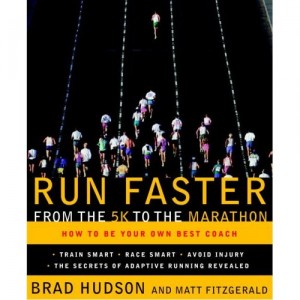 Tread Lightly: Form, Footwear, and the Quest for Injury Free Running by Peter Larson and Bill Katovsky. This running book is perfect for anyone who loves running shoes or has injury problems. In other words, everyone. It shows you how to correct your running form (if you need to), what shoes are best for particular foot types according to the latest research (it’s NOT what you think), and what to avoid to stay healthy. It can be a little dense, but it’s beautifully written and accessible for those who don’t want to wade through scientific jargon.
Tread Lightly: Form, Footwear, and the Quest for Injury Free Running by Peter Larson and Bill Katovsky. This running book is perfect for anyone who loves running shoes or has injury problems. In other words, everyone. It shows you how to correct your running form (if you need to), what shoes are best for particular foot types according to the latest research (it’s NOT what you think), and what to avoid to stay healthy. It can be a little dense, but it’s beautifully written and accessible for those who don’t want to wade through scientific jargon.
Run Faster by Brad Hudson & Matt Fitzgerald. My favorite training book of all-time, Run Faster outlines Brad Hudson’s complete training system that he used with Olympian Dathan Ritzenhein. There are plans for the 5k-Marathon and a great opportunity to see into the mind of an elite coach. Perfect for everyone – a great book to understand why certain training works.
Relentless Forward Progress: A Guide to Running UltraMarathons by Bryon Powell. Thinking about running your first ultra? This is your go-to guide, with daily training plans, lessons on how to trail run, advice from the world’s best ultrarunners, and strategies for race day success. For any first-time ultrarunner, you can’t go wrong with this book.
Digital Training Guides & Books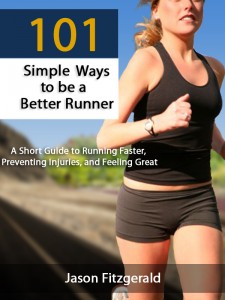
Competitive Triathlon in 10 Hours a Week by Patrick McCrann. This is a digital book and the only triathlon guide I recommend because it can help runners get more from their running. This training guide will help you plan your perfect season, increase your endurance, and build full body athleticism to reduce your chance of injuries.
101 Simple Ways to be a Better Runner: A Short Guide to Running Faster, Preventing Injuries, and Feeling Great (Kindle) by Jason Fitzgerald. This is my book! After looking everywhere for a simple running book that boils down the science and training advice into ACTIONABLE running suggestions, I couldn’t find anything. So I wrote this book to help other runners find simple training advice to help them reach their goals.
Injury Prevention for Runners by Jason Fitzgerald. This is Strength Running’s flagship training program that helps runners train smart, get stronger, and run faster. Including the six “Principles of Prevention,” step-by-step injury treatment protocols, and a library of training plans, it’s the most comprehensive injury prevention program on the market. It also includes interviews with the world’s smartest coaches and authors, brand new strength routines, and 15+ high-quality videos.
Nutrition for Runners by Jason Fitzgerald and Anne Mauney MPH, RD. One of SR’s flagship programs, this comprehensive nutrition product shows runners how to eat for maximum energy, recovery, and performance. With detailed fueling schedules, example meal plans, a training plan library for races of 5k – marathon (and weight loss), and a runner-friendly cookbook it’s your go-to diet, nutrition, and weight loss resource for runners who care about smart fueling. But don’t forget the expert guidance from dietitians and coaches like Nancy Clark, Mario Fraioli, and more.
History of Running Books
The Perfect Mile by Neal Bascomb. If you enjoy the history of track & field, this book is a great account of the events leading up to the first sub-four minute mile. It chronicles the running careers of Roger Bannister, Wes Santee, and John Landy as they attempted what was previously considered impossible: a 3:59 mile.
The Four-Minute Mile by Sir Roger Bannister. Similar to The Perfect Mile, this book is about the first sub-4 mile attempt. Since it’s written by Bannister, you learn a great deal about his life and training. This book is a classic and is sure to inspire you to attempt “impossible” goals.
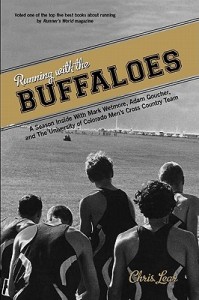 Running with the Buffaloes: A Season Inside with Mark Wetmore, Adam Goucher, and the University of Colorado Men’s Cross-Country Team
Running with the Buffaloes: A Season Inside with Mark Wetmore, Adam Goucher, and the University of Colorado Men’s Cross-Country Team by Chris Lear. If you know somebody on a college cross country team, this book is for you (or them). Running with the Buffaloes showed me what hard training looks like and the value of being on a team. It’s so well written that it reads like a fiction novel.
Iron War: Dave Scott, Mark Allen, and the Greatest Race Ever Run by Matt Fitzgerald. This book is part journalism, part epic story, and part physiology of endurance. It tells the true story of the 1989 Ironman Triathlon and how Dave Scott and Mark Allen broke records and what everyone thought possible to run one of the best triathlons the world has ever seen.
The Last Pick: The Boston Marathon Race Director’s Road to Success by David J. McGillivray. I haven’t read this one yet. I think it will be an interesting read for people with an interest in how marathons work. The book has a clear message of hope, commitment, and ambitious drive – it should be quite inspirational.
Bowerman and the Men of Oregon: The Story of Oregon’s Legendary Coach and Nike’s Cofounder by Kenny Moore. This is another book for the running history enthusiast. Bill Bowerman was the legendary University of Oregon head track coach, cofounder of Nike, and inventor of the modern running shoe. Learn how Nike was started and about the career of American icon Steve Prefontaine.
Inspirational Running Books
Born to Run: A Hidden Tribe, Superathletes, and the Greatest Race the World Has Never Seen by Christopher McDougall. If you’re a
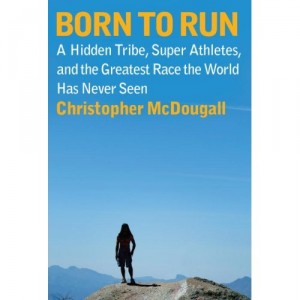 runner and you haven’t read this book, you are living under a rock. It combines an inspiring story with cutting-edge science and a how-to manual of injury-proofing your body and running further than you ever have. Hands down, one of my favorite running books that I’ve ever read.
runner and you haven’t read this book, you are living under a rock. It combines an inspiring story with cutting-edge science and a how-to manual of injury-proofing your body and running further than you ever have. Hands down, one of my favorite running books that I’ve ever read.
Ultramarathon Man: Confessions of an All-Night Runner by Dean Karnazes. One of the latest books I read, it chronicles Karnazes’ most epic ultarendurance races from his marathon to the South Pole, his first Badwater 135-mile Ultramarathon, and his first attempt at running 200 miles. It’s very motivating and can be funny at times. If you’re a serious runner, you may roll your eyes at how Karnazes portrays the sport, but if you can get over that it’s an interesting read.
Why We Run: A Natural History by Bernd Heinrich. This book is fascinating and so hard to describe. The author describes how he started to run as a child (part biography) with his perspectives on human evolution, ultraendurance, and man’s primal drive to win. I’ve reread this book three times and highly recommend it for everyone.
Finding Ultra: Rejecting Middle Age, Becoming One of the World’s Fittest Men, and Discovering Myself by Rich Roll. Rich is a former alcoholic who became a plant-based ultra endurance athlete. This book is a bestseller and Rich is now one of the foremost advocates for a plant-based diet and exercise. While I’m a proud omnivore, I found this to be one of the most motivating books I’ve ever read.
Nutrition & Diet Books
No Meat Athlete: Run on Plants and Discover Fittest, Fastest, Happiest Self by Matt Frazier. Matt is a friend of mine and I’m even quoted in this book. Even though I eat meat, Matt and I agree more than disagree on diet and what it takes to be a healthy, successful runner. Definitely recommended for any plant-based athletes – especially beginners.
Racing Weight: How to Get Lean for Peak Performance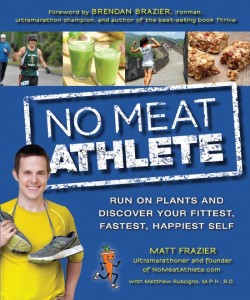 by Matt Fitzgerald. There should be no surprise that there are several books by Matt Fitzgerald on this list – he’s arguably the world’s most prolific endurance sports writer. And as a certified nutritionist, he knows how to get you lean while also maximizing your performance as a runner.
by Matt Fitzgerald. There should be no surprise that there are several books by Matt Fitzgerald on this list – he’s arguably the world’s most prolific endurance sports writer. And as a certified nutritionist, he knows how to get you lean while also maximizing your performance as a runner.
In Defense of Food: An Eater’s Manifesto by Michael Pollan. When it comes to nutrition and diet, I like to keep things as simple as possible. Pollan outlines his philosophy on food and diet in one easy to remember phrase: “Eat food. Mostly Plants. Not too much.” This book is highly recommended if you’re into healthy food and forms the central pillars of my own diet philosophy.
The Paleo Diet for Athletes by Loren Cordain and Joel Freil. The Paleo Diet (or eating foods that we evolved to eat without any processed carbs) actually is compatible with distance running! The authors give a great overview of the Paleo Diet’s background and a complete diet plan for how to implement it with your training.
